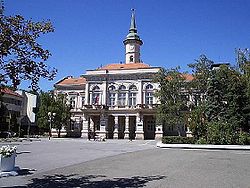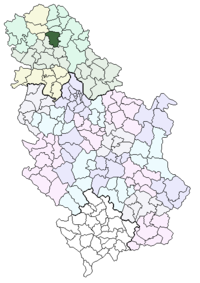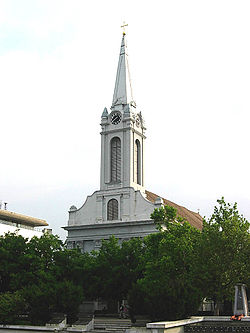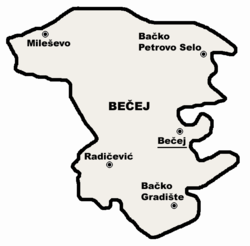- Bečej
-
Bečej
Бечеј
Óbecse— Municipality and Town — Town hall 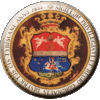
Coat of armsLocation of the municipality of Bečej within Serbia Coordinates: 45°37′N 20°02′E / 45.617°N 20.033°E Country Serbia District South Bačka Settlements 5 Government – Mayor Péter Knézi Area[1] – Municipality 487 km2 (188 sq mi) Population (2011 census)[2] – Town 25,774 – Municipality 40,987 Time zone CET (UTC+1) – Summer (DST) CEST (UTC+2) Postal code 21220 Area code +381 21 Car plates BČ Website www.becej.rs Bečej (Serbian: Бечеј or Bečej, pronounced [bɛ̌tʃɛːj], Hungarian: Óbecse, pronounced [ˈoːbɛtʃɛ], Rusyn: Бечей, Croatian: Bečej, German: Altbetsche, Romanian: Becei, Turkish: Beçe) is a town and municipality located in the South Bačka District in Vojvodina, Serbia. The town has a population of 25,703, while Bečej municipality has 40,877 inhabitants. It is multiethnic town, with Hungarians (45.49%) and Serbs (43.44%) as largest ethnic groups. Linguistically the town has a Slavophonic plurality as Serbs, Yugoslavs, Croats and Montenegrins collectively compose 48.40% of the population.
Contents
History
Bečej was mentioned first during the administration of the Kingdom of Hungary in 1091 under Latin name Bechey[3] and later in 1238 under Hungarian name Becse.[citation needed] Name probably originated from Bechey family that had possessions in this area.[4] In the 15th century (from 1419 to 1441) the town was a possession of the Serbian despot Đurađ Branković. In the end of the 15th century, army of the Kingdom of Hungary led by Serbian despot Vuk Grgurević (Zmaj Ognjeni Vuk) defeated the Ottoman army near Bečej.[5] In 1551, Ottoman army led by Muslim Serb Mehmed paša Sokolović conquered the town.[6] Bečej was administered by the Ottomans between 1551 and 1687 (nominally to 1699) and was part of the Sanjak of Segedin and Budin eyalet.[7] In Ottoman Turkish it was known as "Beçe".
In the end of the 17th century the Ottoman administration was replaced by Habsburg one and settlement was populated by ethnic Serbs from Banat who ran away from the Ottoman Empire. Between 1702 and 1751, the town belonged to the Tisa-Mureş section of the Habsburg Military Frontier. After the abolishment of this part of the Frontier in 1751, many Serbs that lived in the town emigrated to Russia (notably to New Serbia and Slavo-Serbia). They founded a new settlement with name Bečej in New Serbia. To prevent this emigration, the Habsburg authorities formed autonomous District of Potisje with seat in Bečej. District of Potisje existed between 1751 and 1848. The three privileges were given to the district in 1759, 1774 and 1800. First privilege of the District defined its autonomous status, while the second one allowed ethnic Hungarians to settle in the district. In the following period many Hungarians settled in Bečej (the first ones in 1757[8]) and they replaced Serbs as a dominant nation in the town. In 1751, the entire population of the town was composed of Serbs, while in 1774 half of the population was composed of Serbs and another half was composed of Hungarians.[9] According to the 1910 census, the population of Bečej municipality numbered 54,275 people, of whom 30,465 spoke Hungarian and 22,821 Serbian.
Serb elementary school in Bečej was opened in 1703 and it is one of the oldest schools in Vojvodina[10] as well as the first elementary school among Serbs.[11] Hungarian elementary school was opened in Bečej in 1765, while Jewish elementary school was opened in 1882. Serb reading house was opened in 1862, while Hungarian reading house was opened in 1869.
Since 1918, Bečej was part of the Kingdom of Serbs, Croats and Slovenes and subsequent South Slavic states. During the Hungarian Axis occupation, in the 1942 raid, 215 inhabitants of the town were murdered by Hungarian forces, of whom 111 were men, 72 women, 13 children, and 19 old people.[12] By nationality, victims included 110 Jews, 102 Serbs, and 1 Hungarian.[13]
Inhabited places
Bečej municipality includes the town of Bečej and the following villages:
- Bačko Gradište (Hungarian: Bácsföldvár)
- Bačko Petrovo Selo (Hungarian: Péterréve)
- Mileševo (Hungarian: Kutaspuszta and Drea)
- Radičević (Also known as Čikerija)
Note: for settlements with absolute or relative Hungarian majority names are also given in Hungarian.
There are also several sub-settlements in the municipality, including:
- Poljanice (Hungarian: Pecesor)
- Novo Selo
- Drljan
Demographics (2002 census)
Bečej is an ethnically mixed town and municipality.
Ethnic groups in the Bečej town
- Hungarians = 11,725 (45.49%)
- Serbs = 11,197 (43.44%)
- Yugoslavs = 808 (3.14%)
- Croats = 298 (1.16%)
- Roma = 185 (0.72%)
- Montenegrins = 172 (0.67%)
- Others.
Ethnic groups in the Bečej municipality
- Hungarians = 20,018 (48.84%)
- Serbs = 16,832 (41.07%)
- Yugoslavs = 1,070 (2.61%)
- Roma = 479 (1.17%)
- Croats = 437 (1.07%)
- Montenegrins = 229 (0.56%)
- Others.
Settlements by ethnic majority
Settlements with a Hungarian ethnic majority are: Bačko Petrovo Selo (Hungarian: Péterréve) and Mileševo (Hungarian: Kutaspuszta and Drea). There is one settlement with a Serb ethnic majority: Radičević. Two settlements: Bečej (Hungarian: Óbecse) and Bačko Gradište (Hungarian: Bácsföldvár) are ethnically mixed, with the largest ethnic group there being the Hungarians.
Languages in the Bečej municipality
Languages spoken in the Bečej municipality include:
Historical population of the town
- 1961: 24,963
- 1971: 26,722
- 1981: 27,102
- 1991: 26,634
Politics
2008 elections
Results of 2008 local elections in Bečej municipality: [1]
- Hungarian Coalition - Pásztor István - Sándor Pál - 6.366 votes- 29.63% - 13 seats
- Movement for Bečej - Dušan Jovanović - 3.859 votes- 22,22% - 8 seats
- For a European municipality of Bečej - Boris Tadić - Budislav Medurić - 3.646 votes- 16,97% - 7 seats
- Coalition "Serbian Unity for Bečej" - SRS - DSS - NS - Dragan Živkov Džaja - 3.236 votes- 15.06% - 6 seats
- Kao jedna kuća - Mint egy ház (As One Home) - Goran Sadžakov - 1.128 votes- 5.25% - 2 seats
- List "For Our Municipality" - Coalition of PUPS and CG "Successful People" - Milovanov Živko Braca - 756 votes- 3.25%
- Liberal Democratic Party - Old Bečej - New people - Čedomir Jovanović - 732 votes- 3.41%
- Movement for Turn-Over - Jovan Ječanski Jole - 673 votes- 3.13%
- Socialist Party of Serbia - Dr Zora Apić - 627 votes - 2.92%
Municipaly Assembly, counting 36 members, according to party's membership:
- Movement for Bečej (Pokret za Bečej - PzB) - Dušan Jovanović - 8 delegates (now in Democratic party)
- Alliance of Vojvodina Hungarians (Savez vojvođanskih Mađara - SVM) - 6 delegates
- Serbian Radical Party (Srpska radikalna stranka - SRS) - 5 delegates
- Democratic Fellowship of Vojvodina Hungarians (Demokratska zajednica vojvođanskih Mađara - DZVM)- 5 delegates
- Democratic Party (Demokratska stranka - DS) - 4 delegates
- As One Home (Kao jedna kuća - Mint egy ház) - 2 delegates
- Democratic Party of Vojvodina Hungarians (Demokratska stranka vojvođanskih Mađara - DSVM)- 2 delegates
- G17 Plus - 2 delegates (now in Democratic party)
- League of Social Democrats of Vojvodina (Liga socijaldemokrata Vojvodine - LSV) - 1 delegate
- Democratic Party of Serbia (Demokratska stranka Srbije - DSS) - 1 delegate
Local Government consists of: Movement for Bečej (now Democratic party), Alliance of Vojvodina Hungarians, Democratic Party of Vojvodina Hungarians, League of Social Democrats of Vojvodina, Democratic Party and G17 Plus (now Democratic party). Local Parliament's Speaker is Dušan Jovanović (PzB - now DS). Mayor is Péter Knézi (SVM), and his deputy is Budislav Medurić (DS). Members of Municipality Council are: György Ricz (SVM - Health and Social Work), István Acsai (SVM - Local Communities and Civil Organizations), Ilona Varnyú (DSVM - Education and Culture), Dušan Radivojević (PzB - now DS - Economy and Investment), András Boja (PzB - now DS - Agriculture), Marjan Radičević (G17 Plus - now DS - National Investment Plan), Pál Sándor (LSV - Relations of National and Religious Communities) i Dragan Mesaroš (DS - Small and Medium Enterprises)
Notable people
- Janika Balázs (Janika Balaž), Hungarian-speaking ethnic Roma tamburica musician; Grew up here.
- Eufimija Jović, baroness.
- Aleksandar Popović, first Serb geologist.
- Stevan Popović, Serb cultural worker, publisher, parliamentarian.
- Miloš Šarčev, bodybuilder.
- Károly Than, chemist.
- Mór Than, painter.
International relations
See also: List of twin towns and sister cities in SerbiaTwin towns – Sister cities
Bečej is twinned with:
See also
- List of places in Serbia
- List of cities, towns and villages in Vojvodina
- Fantast Castle - 19th century castle in the vicinity of Bečej
References
- Slobodan Ćurčić, Broj stanovnika Vojvodine, Novi Sad, 1996.
- Zvonimir Golubović, Racija u južnoj Bačkoj 1942. godine, Novi Sad, 1991.
- Jovan Mirosavljević, Brevijar ulica Novog Sada 1745-2001, Novi Sad, 2002.
Footnotes
- ^ "Municipalities of Serbia, 2006". Statistical Office of Serbia. http://webrzs.stat.gov.rs/axd/en/Zip/OG2006webE.zip. Retrieved 2010-11-28.
- ^ "2011 Census of Population, Households and Dwellings in the Republic of Serbia – FIRST RESULTS". Bulletin (Statistical Office of the Republic of Serbia) 540. 2011. ISSN 0354-3641. http://media.popis2011.stat.rs/2011/prvi_rezultati.pdf. Retrieved 2011-11-21.
- ^ http://szgnye.vmmi.org/kormendi2006.htm
- ^ http://www.backabanat.com/opstine/istorija_becej.html
- ^ http://www.backabanat.com/opstine/istorija_becej.html
- ^ http://www.backabanat.com/opstine/istorija_becej.html
- ^ http://upload.wikimedia.org/wikipedia/hu/0/05/Torokvilag.jpg
- ^ Dr Slobodan Ćurčić, Naselja Bačke - geografske karakteristike, Novi Sad, 2007, page 243.
- ^ http://www.backabanat.com/opstine/istorija_becej.html
- ^ http://www.backabanat.com/opstine/istorija_becej.html
- ^ http://www.381info.com/juznobacki-okrug
- ^ Zvonimir Golubović, Racija u Južnoj Bačkoj 1942. godine, Novi Sad, 1992, page 147.
- ^ Zvonimir Golubović, Racija u Južnoj Bačkoj 1942. godine, Novi Sad, 1992, page 147.
External links
- Internet becejonline.com - portal of Bečej
- Municipality of Bečej
- History of the town (Hungarian)
- Bečej POI
Municipalities and cities of Serbia Central Serbia Belgrade (Barajevo • Čukarica • Grocka • Lazarevac • Mladenovac • Novi Beograd • Obrenovac • Palilula • Rakovica • Savski Venac • Sopot • Stari Grad • Surčin • Voždovac • Vračar • Zemun • Zvezdara) • Čačak • Jagodina • Kragujevac (Aerodrom • Pivara • Stanovo • Stari Grad • Stragari) • Kraljevo • Kruševac • Leskovac • Loznica • Niš (Crveni Krst • Medijana • Niška Banja • Palilula • Pantelej) • Novi Pazar • Požarevac • Smederevo • Šabac • Užice • Valjevo • Vranje • Zaječar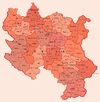 Aleksandrovac • Aleksinac • Aranđelovac • Arilje • Babušnica • Bajina Bašta • Batočina • Bela Palanka • Blace • Bogatić • Bojnik • Boljevac • Bor • Bosilegrad • Brus • Bujanovac • Crna Trava • Čajetina • Ćićevac • Ćuprija • Despotovac • Dimitrovgrad • Doljevac • Gadžin Han • Golubac • Gornji Milanovac • Ivanjica • Kladovo • Knić • Knjaževac • Koceljeva • Kosjerić • Krupanj • Kučevo • Kuršumlija • Lajkovac • Lapovo • Lebane • Lučani • Ljig • Ljubovija • Majdanpek • Mali Zvornik • Malo Crniće • Medveđa • Merošina • Mionica • Negotin • Nova Varoš • Osečina • Paraćin • Petrovac • Pirot • Požega • Preševo • Priboj • Prijepolje • Prokuplje • Rača • Raška • Ražanj • Rekovac • Sjenica • Smederevska Palanka • Sokobanja • Surdulica • Svilajnac • Svrljig • Topola • Trgovište • Trstenik • Tutin • Ub • Varvarin • Velika Plana • Veliko Gradište • Vladičin Han • Vladimirci • Vlasotince • Vrnjačka Banja • Žabari • Žagubica • Žitorađa
Aleksandrovac • Aleksinac • Aranđelovac • Arilje • Babušnica • Bajina Bašta • Batočina • Bela Palanka • Blace • Bogatić • Bojnik • Boljevac • Bor • Bosilegrad • Brus • Bujanovac • Crna Trava • Čajetina • Ćićevac • Ćuprija • Despotovac • Dimitrovgrad • Doljevac • Gadžin Han • Golubac • Gornji Milanovac • Ivanjica • Kladovo • Knić • Knjaževac • Koceljeva • Kosjerić • Krupanj • Kučevo • Kuršumlija • Lajkovac • Lapovo • Lebane • Lučani • Ljig • Ljubovija • Majdanpek • Mali Zvornik • Malo Crniće • Medveđa • Merošina • Mionica • Negotin • Nova Varoš • Osečina • Paraćin • Petrovac • Pirot • Požega • Preševo • Priboj • Prijepolje • Prokuplje • Rača • Raška • Ražanj • Rekovac • Sjenica • Smederevska Palanka • Sokobanja • Surdulica • Svilajnac • Svrljig • Topola • Trgovište • Trstenik • Tutin • Ub • Varvarin • Velika Plana • Veliko Gradište • Vladičin Han • Vladimirci • Vlasotince • Vrnjačka Banja • Žabari • Žagubica • ŽitorađaVojvodina  Ada • Alibunar • Apatin • Bač • Bačka Palanka • Bačka Topola • Bački Petrovac • Bečej • Bela Crkva • Beočin • Čoka • Inđija • Irig • Kanjiža • Kikinda • Kovačica • Kovin • Kula • Mali Iđoš • Nova Crnja • Novi Bečej • Novi Kneževac • Odžaci • Opovo • Pećinci • Plandište • Ruma • Sečanj • Senta • Šid • Srbobran • Sremski Karlovci • Stara Pazova • Temerin • Titel • Vrbas • Vršac • Žabalj • Žitište
Ada • Alibunar • Apatin • Bač • Bačka Palanka • Bačka Topola • Bački Petrovac • Bečej • Bela Crkva • Beočin • Čoka • Inđija • Irig • Kanjiža • Kikinda • Kovačica • Kovin • Kula • Mali Iđoš • Nova Crnja • Novi Bečej • Novi Kneževac • Odžaci • Opovo • Pećinci • Plandište • Ruma • Sečanj • Senta • Šid • Srbobran • Sremski Karlovci • Stara Pazova • Temerin • Titel • Vrbas • Vršac • Žabalj • ŽitišteKosovo Dečani • Đakovica • Dragaš • Glogovac • Gnjilane • Istok • Kačanik • Klina • Kosovo Polje • Kosovska Kamenica • Kosovska Mitrovica • Leposavić • Lipljan • Mališevo • Novo Brdo • Obilić • Orahovac • Peć • Podujevo • Priština • Prizren • Štimlje • Srbica • Štrpce • Suva Reka • Uroševac • Vitina • Vučitrn • Zubin Potok • Zvečan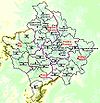 New Municipalities: Đeneral Janković • Gračanica • Junik • Klokot-Vrbovac • Mamuša • Parteš • RanilugPlanned Municipality: North Kosovska MitrovicaCategories:
New Municipalities: Đeneral Janković • Gračanica • Junik • Klokot-Vrbovac • Mamuša • Parteš • RanilugPlanned Municipality: North Kosovska MitrovicaCategories:- Populated places in Vojvodina
- Places in Bačka
- Municipalities of Vojvodina
- South Bačka District
- Bečej
Wikimedia Foundation. 2010.

